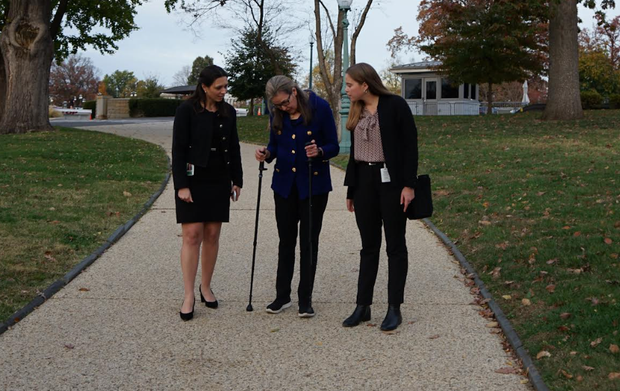Coping with “Parkinson’s on steroids,” Virginia Rep. Jennifer Wexton navigates exhausting and gridlocked Congress
[ad_1]
Rep. Jennifer Wexton, Democrat of Virginia, sat upright but slumped on the dark leather couch in her Capitol Hill office this week, using her right hand to prop up her neck. Diagnosed earlier this year with Progressive Supra-nuclear Palsy, which she has described as “Parkinsons on steroids,” Wexton, who is 55, announced in September that she would retire at the end of her term, in January 2025, because “there is no getting better” from this disease.
She said in a strained voice that the House of Representatives’ 10-week marathon of House sessions and standoffs, a loud and ugly sequence of dysfunction, including the ousting of a House speaker and multiple late-night votes, has taken a toll on her body.
Photo provided by Rep. Wexton’s office
Progressive Supra-nuclear Palsy, as Wexton said, has no cure. At this time, there is no treatment that will slow its progression, and it tends not to respond to medication, according to the National Institutes of Health. It often worsens rapidly, and most patients “develop severe disability within three to five years of symptom onset.” It affects movement — loss of balance is a common symptom — and causes slurred speech. Vision problems often develop as the disease progresses, too.
Wexton described exhaustion, missed therapy appointments and lost sleep as the effects of the recent relentless House schedule. The narrowest of margins between the parties meant she needed to be present on Capitol Hill for the dozens of votes and debates.
Her fatigue was so severe that she suspects it contributed to a painful fall at her home in Virginia four weeks ago. It was the fall that injured her neck and continues to cause her pain.
“It’s just so hard for me now,” Wexton told CBS News. Her voice and her ability to speak have been impaired by her medical condition, and her fatigue has grown.
“Fatigue absolutely does have an impact,” she said during an extended interview. “The most important thing you can do is get sleep.”
She teared up several times as she echoed the message she sent to constituents in a written statement earlier this year: “I’m heartbroken to have to give up something I have loved after so many years of serving my community.”
“I’ve been worse since September. It’s been tiring. It’s been really hard being here for the ten weeks,” she said. “It’s awful.”
Her voice is barely louder than a whisper, and her ability to enunciate has been weakened. She speaks quickly, and her speech is at times difficult to decipher. Wexton and her staff regularly encourage colleagues and visitors to ask her to repeat herself if they can’t understand what she’s saying.
Wexton said the physical impairments and the challenges posed by speaking are especially painful after a professional life of oratory as a trial attorney, a state legislator and a distinctive campaign for the House, in which she succeeded in flipping a longtime Republican House district to Democratic control.
“I want to try to jump into conversations, and I can’t,” Wexton said. “Cognitively, I’m just fine. It’s just so frustrating for me to not be able to communicate verbally.”
Wexton said the raucous House chamber is an increasingly difficult venue in which to work. Her hearing is impaired and her voice no longer carries, both effects of the disease.
“It’s hard because when you need to be on the [House] floor, you need to be on the floor,” she said.
Wexton says her colleagues are supportive, but she indicated some are becoming more distant. “They don’t know what to do with me, because they can’t understand me,” she said.
As Congress was leaving for the Thanksgiving recess, Wexton’s chief of staff, Abby Carter, sent a letter to her fellow House lawmakers to explain the dramatic changes they were seeing in Wexton and advise them on how to interact with her.
“Our team knows that her current neck strain can be jarring to see and it can be difficult for Members to understand the Congresswoman, especially on the floor when it’s loud,” Carter wrote. “We ask that you give her some patience when you are speaking with her in person. It is completely okay to ask her to repeat herself (we do it regularly), ask her to write down what she’s saying on her iPad, ask our staffer who is with her on the floor to help, or just tell her that you’ll follow up in texts.”
“You may also have seen her crying on the floor and assume she’s really upset or something is wrong,” Carter continued, “but crying more easily is another symptom of the disease. Sometimes she’ll cry about happy moments or sad things. Sometimes the warmest hug from certain Members or friends will also spark tears. When the tears do come, that also affects her ability to speak in a way that you can easily understand.”
Carter stressed that Wexton’s “cognitive abilities are not affected by PSP,” and she “notices when people speak to her like a child because they wrongfully assume she is cognitively declining.” Treat her “like you did” before she announced her diagnosis, Carter asked.
Her aides and colleagues said this month’s long and unpredictable stretch of House business in the Capitol forced Wexton to miss some of her speech therapy and physical therapy sessions, which are critical to help counteract the symptoms of Progressive Supra-nuclear Palsy.
She traverses the Capitol complex with aides and walking sticks. Wexton acknowledges the increasing challenge of navigating the sprawling Capitol complex on foot, while fighting the pain and mobility limitations of her disease.
“There’s a lot of back and forth,” she said. “It’s hard on everything.”
Wexton said moving around her own house can be a challenge. She leans heavily on the countertops to hold up her body as she moves across her kitchen.
She has adopted some text-to-voice technology to help her communicate with visitors, constituents and colleagues. Wexton uses text chains to share ideas and still jokes with other members of the House. She said her fellow third-term Democrat Jahana Hayes of Connecticut told her, “You’re just as witty and funny as ever.”
Wexton said, “It was really nice of her to say that.”
“Over the past few months, I have watched as she has faced physical and verbal challenges and is unable to engage in the way that I am used to,” Hayes told CBS News. “However, I also continue to interact with her daily on text threads and chats, and she is still the same sharp, witty, sarcastic, quick, funny and intelligent person I met in 2019. Despite what is seen on the outside, Jenn is still Jenn.”
Wexton said she still has hopes for legislative accomplishments and advocacy in the final 14 months of her congressional career.
“Childhood cancer research is really important to me,” she said. Wexton wants Congress to do more to ensure research and support for “brain health and Parkinson’s, and to find a cure for (Progressive Supra-nuclear Palsy) and to [give] people more resources for it.”
Her vote remains pivotal in the narrowly divided House, where key votes have small margins of error. Wexton said her medical condition is always threatening to make her existence a lonely and sad one because of the toll it takes on her ability to communicate. But she said the support of her family, colleagues and staff have prevented her from feeling isolation and deep sadness. And she’ll continue relying on that network as she finishes her final term in Congress: “I have a lot I still want to do.”
[ad_2]
Source link












